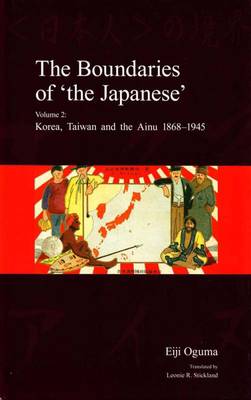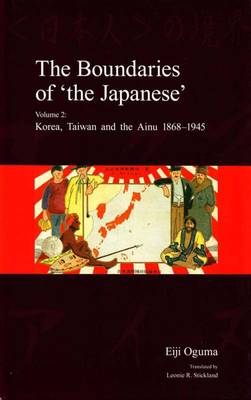
Door een staking bij bpost kan je online bestelling op dit moment iets langer onderweg zijn dan voorzien. Dringend iets nodig? Onze winkels ontvangen jou met open armen!
- Afhalen na 1 uur in een winkel met voorraad
- Gratis thuislevering in België vanaf € 30
- Ruim aanbod met 7 miljoen producten
Door een staking bij bpost kan je online bestelling op dit moment iets langer onderweg zijn dan voorzien. Dringend iets nodig? Onze winkels ontvangen jou met open armen!
- Afhalen na 1 uur in een winkel met voorraad
- Gratis thuislevering in België vanaf € 30
- Ruim aanbod met 7 miljoen producten
Zoeken
€ 111,95
+ 223 punten
Uitvoering
Omschrijving
In this the parallel volume to The Boundaries of 'the Japanese': Volume 1: Okinawa 1818-1972 (2014), renowned historical sociologist Eiji Oguma further explores the fluctuating political, geographical, ethnic, and sociocultural borders of 'Japan' and 'the Japanese' from the latter years of the Tokugawa shogunate to the mid-20th century. Focus is placed first upon the northern island of Hokkaido with its indigenous Ainu inhabitants, and then upon the mainstays of Japan's colonial empire-Taiwan and Korea. In continuing to elaborate his theme of inclusion and exclusion, the author comprehensively recounts and analyzes the events, actions, campaigns and attitudes of both the rulers and the ruled as Japan endeavoured both to be seen as a strong, civilized nation by the wider world, and to 'civilize' its disparate subjects on its own terms. (Series: Japanese Society Series) [Subject: Sociology, Cultural Anthropology, Asian Studies, Japanese Studies, Cultural Studies, History]
Specificaties
Betrokkenen
- Auteur(s):
- Uitgeverij:
Inhoud
- Aantal bladzijden:
- 590
- Taal:
- Engels
- Reeks:
Eigenschappen
- Productcode (EAN):
- 9781925608953
- Verschijningsdatum:
- 17/04/2017
- Uitvoering:
- Hardcover
- Formaat:
- Genaaid
- Afmetingen:
- 140 mm x 218 mm
- Gewicht:
- 997 g

Alleen bij Standaard Boekhandel
+ 223 punten op je klantenkaart van Standaard Boekhandel
Beoordelingen
We publiceren alleen reviews die voldoen aan de voorwaarden voor reviews. Bekijk onze voorwaarden voor reviews.











